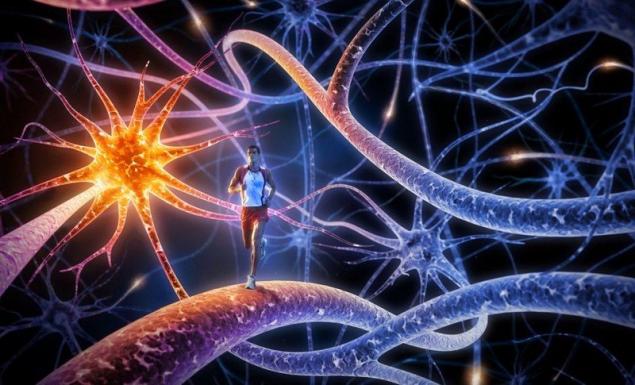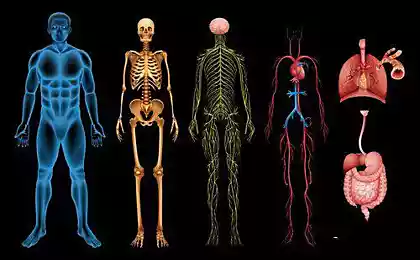457
How mind and body affect each other
What is stress?
Medical researchers are increasingly beginning to recognize that thoughts and feelings have a direct impact on the functioning of the body. "Stress" is now associated with a diverse range of diseases, including stomach ulcers, cancer, skin problems, back pain and infertility.

Currently, in the field of psycho-neuro-immunology revealed many mechanisms by which the mind can affect the body. Were discovered previously unrecognized network of communication between the nervous, hormonal and immune systems, which provide the link between our psychological States and the way in which aktiviziruyutsya reaction to the disease. These mechanisms translate the psychological experience with physiological function.
The researchers found that patients suffering from major depression, have higher levels of the hormone cortisol circulating in their blood. Cortisol is secreted by the adrenal glands when the body is in a state of tension.
However, cortisol also suppresses the immune system, reducing its ability to fight the disease. Therefore, stress or depression tend to lead to illness.
In addition, it was discovered communications network providing two-way transmission of messages between nervous and immune systems. The nerve endings were detected in some tissues of the immune system, allowing them to directly communicate with the nervous system. These links refute pre-existing beliefs about what the immune system is functioning independently.

It was also found that the lymphocytes (immune cells) that help your body fight infection, have on their surface receptors that are able to substances such as hormones and neurotransmitters. It connects the activity of the immune cells with the activity of chemical transmitters of messages, used hormonal and nervous systems.
On the functioning of lymphocytes and thus the immune response may exert a strong influence the brain through the release of hormones and neurotransmitters. It was also discovered that lymphocytes produce chemical active substances, called lymphokines. These substances are capable of sending messages back to the brain, allowing it to monitor the activity of lymphocytes and to ensure two-way feedback mechanism between these systems.
Surprisingly, it was discovered that lymphocytes can also produce hormones that can regulate the activity of the nervous system. This provides another link between the functioning of the immune system with nervous and hormonal. Since the activity of the brain is closely connected with psychological experiences, these data help to explain some of the ways in which mind and body affect each other. In this new understanding of the immune system may even be viewed as an extension of the nervous system, helping it to regulate the internal balance of the body. published
Author: Michael Kern
P. S. And remember, just changing your mind - together we change the world! ©
Source: vk.com/event53269168?w=wall-53269168_113%2Fall
Medical researchers are increasingly beginning to recognize that thoughts and feelings have a direct impact on the functioning of the body. "Stress" is now associated with a diverse range of diseases, including stomach ulcers, cancer, skin problems, back pain and infertility.

Currently, in the field of psycho-neuro-immunology revealed many mechanisms by which the mind can affect the body. Were discovered previously unrecognized network of communication between the nervous, hormonal and immune systems, which provide the link between our psychological States and the way in which aktiviziruyutsya reaction to the disease. These mechanisms translate the psychological experience with physiological function.
The researchers found that patients suffering from major depression, have higher levels of the hormone cortisol circulating in their blood. Cortisol is secreted by the adrenal glands when the body is in a state of tension.
However, cortisol also suppresses the immune system, reducing its ability to fight the disease. Therefore, stress or depression tend to lead to illness.
In addition, it was discovered communications network providing two-way transmission of messages between nervous and immune systems. The nerve endings were detected in some tissues of the immune system, allowing them to directly communicate with the nervous system. These links refute pre-existing beliefs about what the immune system is functioning independently.

It was also found that the lymphocytes (immune cells) that help your body fight infection, have on their surface receptors that are able to substances such as hormones and neurotransmitters. It connects the activity of the immune cells with the activity of chemical transmitters of messages, used hormonal and nervous systems.
On the functioning of lymphocytes and thus the immune response may exert a strong influence the brain through the release of hormones and neurotransmitters. It was also discovered that lymphocytes produce chemical active substances, called lymphokines. These substances are capable of sending messages back to the brain, allowing it to monitor the activity of lymphocytes and to ensure two-way feedback mechanism between these systems.
Surprisingly, it was discovered that lymphocytes can also produce hormones that can regulate the activity of the nervous system. This provides another link between the functioning of the immune system with nervous and hormonal. Since the activity of the brain is closely connected with psychological experiences, these data help to explain some of the ways in which mind and body affect each other. In this new understanding of the immune system may even be viewed as an extension of the nervous system, helping it to regulate the internal balance of the body. published
Author: Michael Kern
P. S. And remember, just changing your mind - together we change the world! ©
Source: vk.com/event53269168?w=wall-53269168_113%2Fall























